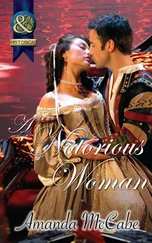Nicolai tuned his lute again, strummed a few chords, standing as he began his song. The words were only half-remembered, a poem by Sir Thomas Wyatt, who, like Nicolai, had led something of a nomadic life. They had caught Nicolai’s fancy and he set them to music, only for his own amusement. He had never sung them for an audience until now.
And truly it seemed only an audience of one. Marguerite’s steady gaze followed him as he strolled around the room, stopping beside this lady and that while really he sang only to her.
“‘And wilt thou leave me thus, that hath loved thee so long in wealth and woe among? And is thy heart so strong as for to leave me thus? Say nay, say nay!’”
Marguerite propped her chin in her cupped hand, wine and sweetmeats seemingly forgotten as she watched him. Her face was bland, serene, she gave naught away, yet she did not turn from him. And, deep in her eyes, there was spark like a ray of light in that ancient forest.
“‘And wilt thou leave me thus, that hath given thee my heart never for to depart, neither for pain nor smart? And wilt thou leave me thus? Say nay, say nay!’”
He smiled at Señorita Alva as he rounded her table and she giggled back, but he ended his song next to Marguerite. Her shoulders tensed warily beneath the white satin of her gown, yet she did not turn away.
“‘And wilt thou leave me thus, and have no more pity on him that loveth thee? Alas thy cruelty! And wilt thou leave me thus? Say nay, say nay!’”
Nicolai strummed out the last of his tune, a soft flurry that echoed the “say nay, say nay,” and the song died away. He bowed amid applause, his watchful gaze never leaving Marguerite.
“Well, mademoiselle, what say you to my song?” he asked. “Did it please you?”
She paused for a long moment. “Perhaps there is one fine English song. When it is sung by a Muscovite.”
There was a wave of laughter, a round of more wine. “Perhaps you would favour us with a French song, Señorita Dumas?” Dona Elena asked. “I am sure you must have a pretty voice.”
“Not as pretty as Monsieur Ostrovsky, I fear,” Marguerite said. “I would make a poor showing after him, especially as I am rather weary. I would be most happy to sing for you on another occasion, though, if I am given a Spanish song in return.”
“Another time, then, Señorita Dumas. We will look forward to it,” Dona Elena said kindly. “Nicolai, will you escort Señorita Dumas to her chamber? We have kept her too long tonight.”
“Oh, no, Dona Elena, one of the pages will light my way back,” Marguerite said. “It is not far, and I would not wish to deprive you of Monsieur Ostrovsky’s interesting company. Thank you for your kind hospitality tonight, I have greatly enjoyed it.”
With a graceful curtsy, a swirl of white-and-silver skirts, she was gone, led by one of the eager young pages. The chamber went back to its low hum of conversation, the soft flicker of new hands of cards being dealt. But to Nicolai it seemed that all the light had vanished, leaving only smoky, smudged shadows.
Dona Elena beckoned him closer. “She is very beautiful, is she not?” she whispered.
Nicolai smiled. “I think that can hardly be denied.”
“Yet she seems so sad. She is an orphan, you know, with no one to look after her interests in this world.”
Nicolai thought Marguerite more than capable of seeing after her own “interests.” But Dona Elena was right about the sadness. Sometimes it seemed to cling to Marguerite like a winter mist, blurring and obscuring her real self, hidden behind that beauty, which was all anyone seemed to see. “It was kind of you to befriend her.”
“And you, too, Nicolai? Your song tonight seemed to cheer her. Truly, amado, you are the most merry person I know!”
“Dona Elena, are you trying to matchmaker again?” Nicolai teased.
She laughed. “You could not marry a French woman! But everyone needs music, diverting company. Especially lonely young ladies—as long as it does not go too far.”
Nicolai remembered Venice, his hand on Marguerite’s naked thigh, his mouth on her breast, the smell and taste of her wrapping around his senses, driving him to lunacy. They had already gone past “too far”!
“I fear Mademoiselle Dumas could hardly escape my company,” he said. “We are to work on a pageant together.”
“Very good! I am sure it will be the finest ever seen in this dull place. Now, will you sing us another song? Señorita Alva seemed to enjoy the last one as well…”
Marguerite slipped the thin wire into the lock and, with a quick flick of her wrist, popped it upward. She felt the give of the mechanism as it parted, and the lock fell from the box’s clasp.
Really, she thought. These Spanish are surprisingly lax. That lock was far too easy to pick. Could it be some kind of trap, a test? She glanced back over her shoulder, but the room was empty. Silent.
She had noticed this box during the card party, a plain, unadorned wooden chest of the sort often used to transport or store documents. It sat amid a welter of empty diplomatic pouches and blank sheets of parchment on a table near the window, too tempting to resist. It could not contain anything too secret; Don Carlos did not strike her as a fool. But any information at all could prove useful.
And Marguerite sorely needed a distraction from thoughts of Nicolai. When she went to lie down in her bed she could not sleep, for she kept hearing his song in her mind. And have no more pity on him that loveth thee.
Marguerite frowned as she slid the lock free and raised the lid of the box. He was a talented actor indeed, for his words, his countenance, his entire being reflected the words as he sang, as if he truly knew what love was, what it could be. As if he alone possessed the secrets to all hearts.
She could never share that knowledge, for love was only a mystery, a puzzlement, to her. She had seen it only as a lie, a game, a flirtatious song with no meaning behind it. A hollow, shining little bubble.
And that was all Nicolai’s poetry was, too. Yet his eyes imbued the sweet words with more…
“ Couilles, ” she cursed. The wire she still held bit into her hand as her fingers tightened over it, leaving a thin line of blood. Nicolai Ostrovsky was a distraction, and she had to forget him. Work was all that mattered.
Hastily wrapping her hand in a handkerchief so she wouldn’t leave telltale spots of blood, she began to sort through the box. The papers appeared to be personal letters to Don Carlos and his attendants, as well as an inventory of the rich gifts brought for King Henry. She had been right, there was not much here to be of help to King François. All the information she gleaned as she surveyed the missives told her only what she already knew, that the Spanish were to stop the French alliance in any way they could. That they were allied with Queen Katherine, as always.
She quickly memorised a few useful titbits, and started to put them back carefully in the order she found them. But in the bottom she found one more letter.
Marguerite unfolded the parchment, soft from its journey, from having been read many times, even though the date written on the back indicated it had only been delivered yesterday.
“For the most exalted Duchess de Bernaldez—or should I say Mother? I trust your journey was safe and England all you expected. May you and Don Carlos achieve all your ends and return home to meet your new grandson, Antonio Velazquez. Julietta was safely delivered…”
Ah, a letter from her son. For the first time, Marguerite felt she was intruding by reading those words. She started to refold the letter, when Nicolai’s name caught her eye and she glanced at it again.
Читать дальше












